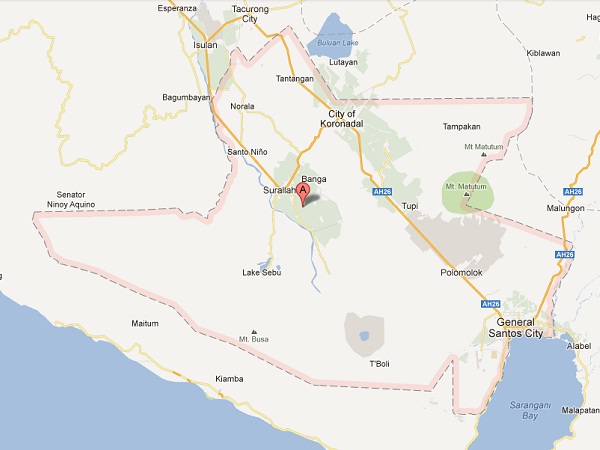Tribal uprising feared after killings
DIGOS CITY, Philippines—Local officials here said they feared a tribal uprising (pangayaw) as human rights activists insisted on Saturday that the deaths of the wife and two young children of a B’laan antimining leader was not the result of an armed encounter, as earlier claimed, by the military.
According to Catholic Church-based human rights advocates, their own investigation did not indicate that there had been a firefight. Army soldiers strafed the house of B’laan leader Dagil Capion at 6 a.m. on Thursday, resulting in the death of Capion’s pregnant wife, Juvy, and their children—Pop, 13, and John, 8.
Another child, Vicky, 7, was wounded. Capion was also reportedly wounded but was able to escape.
According to the fact-finding reports of the Social Action Center of the Catholic diocese of Marbel and Karapatan, a human rights group, men of the 27th Infantry Battalion under Lt. Col Alexis Bravo raided the Capion house in Sitio Datal-Alyong—a community bordering Tampakan, South Cotabato and Kiblawan, Davao del Sur.
Pastor Sadrach Sabella, spokesperson of Karapatan in southeastern Mindanao, quoted 36-year-old Capion as telling them via mobile phone that he was sipping coffee outside his house with his 13-year-old son when the soldiers suddenly arrived and opened fire. His wife and other children were sleeping inside at the time.
Article continues after this advertisementSabella said witnesses told the fact-finding team that there was no firefight and that what transpired was a strafing.
Article continues after this advertisement“They were killed simply because they opposed large-scale mining in the area,” Sabella said, adding that Capion’s wife was also a member of Kalgad, a Lumad organization opposed to large-scale mining.
Mayor Marivic Diamante of Kiblaway has told the police in her town to “prepare for the worst.”
Interviewed by the Inquirer by phone, she admitted that Capion commanded a following among the B’laans and it was not remote that they would wage a pangayaw against government forces.
“We are now preparing for this,” she said
Diamante said there was now a manhunt on for Capion. A P300,000 bounty has been offered for his capture—dead or alive.
Bandit, not activist
Contrary to claims by rights groups, Diamante said Capion was a “bandit” who led in cattle-rustling and robbery activities in areas bordering Kiblawan and Tampakan, and “was never an antimining activist.”
However, it was also reported that the soldiers had tried to arrest Capion for his alleged role in a 2010 ambush of an Army team.
Sources from the antimining side, however, said Capion—descended from the tribe’s royal clan—took up arms after the murder in 2002 of his uncle, Gorelmin Malid, who opposed the entry of the Australian firm Western Mining Corp.
Sabella said the “massacre” of Capion’s wife and children was made more painful by the fact that the soldiers exposed the cadavers under the sun for more than eight hours. “This was the height of disrespect,” the Karapatan spokesperson said.
Lt. Col. Lyndon Paniza, spokesperson of the Army’s 10th Infantry Division, the unit that has jurisdiction over Kiblawan and Tampakan, said that what occured was a “legitimate encounter.” The deaths of Capion’s wife and children and the wounding of his daughter was “unfortunate” but this was “not intentional,” he said.
“Our troops responded after they received reports from civilians about the presence of Dagil Capion and his men in the area. They were unaware that his family was also inside the hut,” Paniza reiterated.
“If there were lapses on the part of our troops, then they will face charges. Instances like this are inevitable, especially in the field as our men are mandated to secure and protect the people,” Paniza said.
The incident has begun to draw statements from environmental groups and other indigenous peoples organizations.
The Kalikasan party-list group rejected the military’s explanation that Capion’s wife and two children died in the crossfire.
Explanation rejected
In a statement furnished the Inquirer on Saturday, Kalikasan said the incident was one among many incidents of civilians getting killed while in defense of the environment or their ancestral domains.
The group said Capion has been defending the B’laans’s ancestral domain against Sagittarius Mines Inc. (SMI).
Party-list group Katribu also said Capion, part of the Bong Mal community, had been vocal about its objections to the proposed Tampakan copper and gold project in South Cotabato which is expected to displace more than 30,000 B’laan people.”
In Baguio City, the chair of the House committee on national cultural communities urged President Aquino to address the spate of killings of indigenous community leaders, many of whom have ties to antimining lobbies.
Ifugao Rep. Teodoro Baguilat Jr. said 26 leaders of indigenous communities had been murdered since President Aquino took office in 2010.
Baguilat, a Liberal Party member, also rejected the military’s explanation. He said he could not accept the murder of civilians “no matter how much the military justifies killing as a counter-insurgency move.” With reports from Allan Nawal, Orlando Dinoy and Aquiles Zonio, Inquirer Mindanao; and Vincent Cabreza, Inquirer Northern Luzon
